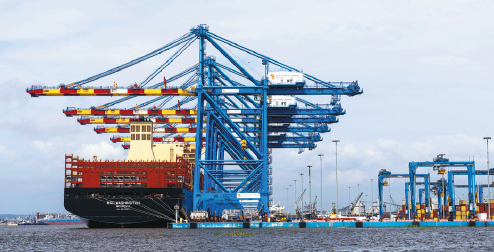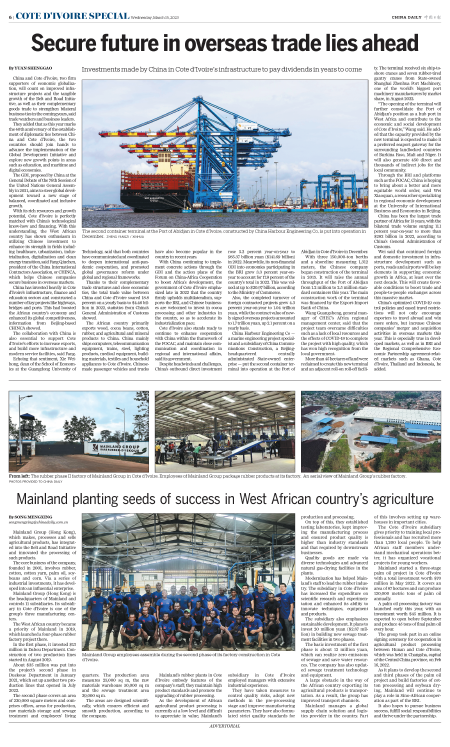
The second container terminal at the Port of Abidjan in Cote d'Ivoire, constructed by China Harbour Engineering Co, is put into operation in December.
China and Cote d'Ivoire, two firm supporters of economic globalization, will count on improved infrastructure projects and the tangible growth of the Belt and Road Initiative, as well as their complementary goods trade to strengthen bilateral business ties in the coming years, said trade watchers and business leaders.
They added that as this year marks the 40th anniversary of the establishment of diplomatic ties between China and Cote d'Ivoire, the two countries should join hands to advance the implementation of the Global Development Initiative and explore new growth points in areas such as education, and maritime and digital economies.
The GDI, proposed by China at the General Debate of the 76th Session of the United Nations General Assembly in 2021, aims to steer global development toward a new stage of balanced, coordinated and inclusive growth.
With its rich resources and growth potential, Cote d'Ivoire is perfectly matched with China's technological know-how and financing. With this understanding, the West African country has shown enthusiasm in utilizing Chinese investment to enhance its strength in fields including healthcare, urbanization, industrialization, digitalization and clean energy transition, said Fang Qiuchen, president of the China International Contractors Association, or CHINCA, which helps Chinese companies secure business in overseas markets.
China has invested heavily in Cote d'Ivoire's infrastructure, finance and education sectors and constructed a number of key projects like highways, bridges and ports. This had boosted the African country's economy and enhanced its global competitiveness, information from Beijing-based CHINCA showed.
The collaboration with China is also essential to support Cote d'Ivoire's efforts to increase exports, and build more infrastructure and modern service facilities, said Fang.
Echoing that sentiment, Xie Weihong, dean of the School of Economics at the Guangdong University of Technology, said that both countries have communicated and coordinated to deepen international anti-pandemic cooperation, and promoted global governance reform under global and regional frameworks.
Thanks to their complementary trade structures and close economic ties, the total trade value between China and Cote d'Ivoire soared 18.8 percent on a yearly basis to $4.46 billion in 2022, statistics from China's General Administration of Customs showed.
The African country primarily exports wood, cocoa beans, cotton, rubber, and agricultural and mineral products to China. China mainly ships computers, telecommunication equipment, trains, steel, lighting products, medical equipment, building materials, textiles and household appliances to Cote d'Ivoire. Chinese-made passenger vehicles and trucks have also become popular in the country in recent years.
With China continuing to implement concrete actions through the GDI and the action plans of the Forum on China-Africa Cooperation to boost Africa's development, the government of Cote d'Ivoire emphasized late in 2022 that the country firmly upholds multilateralism, supports the BRI, and Chinese businesses are welcomed to invest in cocoa processing and other industries in the country, so as to accelerate its industrialization pace.
Cote d'Ivoire also stands ready to continue to enhance cooperation with China within the framework of the FOCAC, and maintain close communication and coordination in regional and international affairs, said its government.
Despite headwinds and challenges, China's outbound direct investment rose 5.2 percent year-on-year to 985.37 billion yuan ($141.69 billion) in 2022. Meanwhile, its non-financial ODI into economies participating in the BRI grew 3.3 percent year-on-year to account for 17.9 percent of the country's total in 2022. This was valued at up to $20.97 billion, according to the Ministry of Commerce.
Also, the completed turnover of foreign contracted projects grew 4.3 percent year-on-year to 1.04 trillion yuan, while the contract value of newly signed overseas projects amounted to 1.7 trillion yuan, up 2.1 percent on a yearly basis.
China Harbour Engineering Co — a marine engineering project specialist and a subsidiary of China Communications Construction, a Beijing-headquartered centrally administrated State-owned enterprise — put the second container terminal into operation at the Port of Abidjan in Cote d'Ivoire in December.
With three 150,000-ton berths and a shoreline measuring 1,312 meters, the Chinese company began construction of the terminal in 2015. It will raise the annual throughput of the Port of Abidjan from 1.2 million to 2.5 million standard containers this year. The main construction work of the terminal was financed by the Export-Import Bank of China.
Wang Guangsheng, general manager of CHEC's Africa regional management center, said that the project team overcame difficulties such as a lack of local resources and the effects of COVID-19 to complete the project with high quality, which has won high recognition from the local government.
More than 45 hectares of land were reclaimed to create this new terminal and an adjacent roll-on roll-off facility. The terminal received six ship-to-shore cranes and seven rubber-tired gantry cranes from State-owned Shanghai Zhenhua Port Machinery, one of the world's biggest port machinery manufacturers by market share, in August 2022.
"The opening of the terminal will further consolidate the Port of Abidjan's position as a hub port in West Africa and contribute to the economic and social development of Cote d'Ivoire," Wang said. He added that the capacity provided by the new terminal is expected to make it a preferred seaport gateway for the surrounding landlocked countries of Burkina Faso, Mali and Niger. It will also generate 450 direct and thousands of indirect jobs for the local community.
Through the BRI and platforms such as the FOCAC, China is hoping to bring about a better and more equitable world order, said Wei Xiaoquan, a researcher specializing in regional economic development at the University of International Business and Economics in Beijing.
China has been the largest trade partner of Africa for 13 years, with the bilateral trade volume surging 11.1 percent year-on-year to more than $282 billion in 2022, according to China's General Administration of Customs.
Wei said that continued foreign and domestic investment in infrastructure development such as ports, roads and airports will be key elements in supporting economic growth in Africa, at least over the next decade. This will create favorable conditions to boost trade and people-to-people exchanges across this massive market.
China's optimized COVID-19 control policies and eased travel restrictions will not only encourage exporters to travel abroad and win more orders, but increase Chinese companies' merger and acquisition activities in overseas markets this year. This is especially true in developed markets, as well as in BRI and the Regional Comprehensive Economic Partnership agreement-related markets such as Ghana, Cote d'Ivoire, Thailand and Indonesia, he added.

